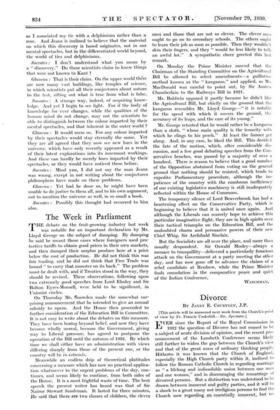The Week in Parliament
fr HE debate on the fruit-growing industry last week was notable for an important declaration by Mr. Lloyd George on the subject of dumping. By dumping he said he meant those cases where foreigners used pro- tective tariffs to obtain good prices in their own markets, and then dumped their surplus produce here at a price below the cost of production. He did not think this was fair trading, and he did not think that Free Trade was bound" to carry that monster on its back." The problem must be dealt with, and if Treaties stood in the way, they should be revised. These observations, following upon two extremely good speeches from Lord Elmley and Sir Bolton Eyres-Monsell, were held to be significant, in Unionist circles.
On Thursday Mr. Snowden made the somewhat sur- prising announcement that he intended to give an annual subsidy to opera. And the House then proceeded to further consideration of the Education Bill in Committee. It is not easy to write about the debates on this measure. They have been boring beyond belief, and now they have become wholly unreal, because the Government, giving way to Liberal pressure, has agreed to postpone the operation of the Bill until the autumn of 1932. By which time we shall either have an administration with views differing sharply from those of the present one, or the country will be in eriremis.
Meanwhile an endless drip of theoretical platitudes concerning a measure which has now no practical applica- tion whatsoever to the urgent problems of the day, con- tinues, and seems likely to continue, from both sides of the House. It is a most frightful waste of time. The best speech the present writer has heard was that of Sir Nairne Stewart Sandeman. It lasted for three minutes. He said that there are two classes of children, the clever ones and those that are not so clever. The clever ones ought to go on to secondary schools. The others ought to learn their job as soon as possible. Then they wouldn't skin their fingers, and they "would be less likely to talk an awful lot." A sympathetic cheer greeted this last remark.
On Monday the Prime Minister moved that the Chairman of the Standing Committee on the Agricultural Bill be allowed to select amendments—a guillotine method known as the "kangaroo," and applied, as Mr. MacDonald was careful to point out, by Sir Austen Chamberlain to the Railways Bill in 1921.
Mr. Baldwin opposed it partly because he didn't like the Agricultural Bill, but chiefly on the ground that the kangaroo resembles Mr. Lloyd George—" it is notable for the speed with which it covers the ground, the accuracy of its leaps, and the care of its young."
Mr. George retorted that he would rather be a kangaroo than a sloth, "whose main quality is the tenacity with which he clings to his perch." At least the former got along. And, in any case, he liked the Bill. This decided the fate of the motion, which, after considerable dis- cussion, and a few good debating speeches from the Con- servative benches, was passed by a majority of over a hundred. There is reason to believe that a good number of the Opposition abstained from voting on the general ground that nothing should be resisted, which tends to expedite Parliamentary procedure, although the im- patience of the country with the cumbrous inefficiency of our existing legislative machinery is still inadequately reflected within the House of Commons.
The temporary silence of Lord Beaverbrook has had a heartening effect on the Conservative Party, which is beginning to believe that it is united once again. And although the Liberals can scarcely hope to achieve this particular imaginative flight, they are in high spirits over their tactical triumphs on the Education Bill, and the undoubted charm and persuasive powers of their new Chief Whip, Sir Archibald Sinclair.
But the Socialists are all over the place, and more than Usually despondent. Sir Oswald Mosley—always a menace to tranquillity—delivered a particularly ferocious attack on the Government at a party meeting the other day, and has now gone off to advance the claims of a rebel candidate at Renfrew, while the Prime Minister finds consolation in the comparative peace and quiet of the Indian Conference.
WATCIDIAN,










































 Previous page
Previous page